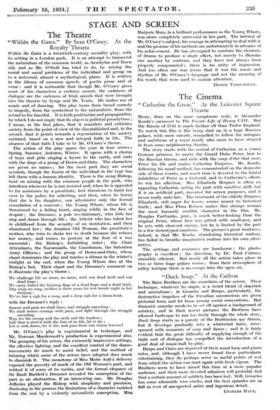The Cinema
"Catherine the Great." At the Leicester Square Theatre
HERE, done on the same sumptuous scale, is Alexander Korda's successor to The Private Life of Henry KILT. But the Russia of 1745 is much farther off than Tudor England. To watch this film is like being shut up in a huge Russian palace, with snow outside, compelled to follow the intrigues and ambitions of a royal family who seem to have strayed in from some neighbouring theatre. - The story starts with the arrival of Catherine, as a young- German princess, to marry the Grand Duke Peter, heir te the Russian throne, and ends with the coup d'etat that costs Peter his life and makes -Catherine Empress. Mr. Korda, following his usual method, has concentrated on the domestic side of these events, and much time is devoted to the brutal infidelities of Peter as a husband, and to Catherine's efforts to win his affection. Miss Elizabeth Bergner is often an appealing Catherine, acting the part With- sensitive skill, but it is an artificial part, invented for screen purposes, and it never really suits- her. The treatment of the elderly Empress Elizabeth, still eager for lovers, comes nearer to historical truth ; and Miss Flora Robson makes this strange woman the most humanly credible character in the film. Mr. Douglas Fairbanks, junr., is much better-looking than the original Peter, whose face was pitted with small-pox, and he acts with clear-cut energy, but he is limited by the part to a few stereotyped emotions. The picture's great weakness, indeed, is that Mr. Korda, abandoning historical realism, has failed to breathe imaginative realism into his own alter- native.
The settings and costumes are handsome ; the photo, graphy is excellent ; the direction, by Dr. Paul Czinner, smoothly efficient. But nearly all the action takes place in two or three huge palace rooms ; from their atmosphere of sultry intrigue there is no escape into the open air.








































 Previous page
Previous page